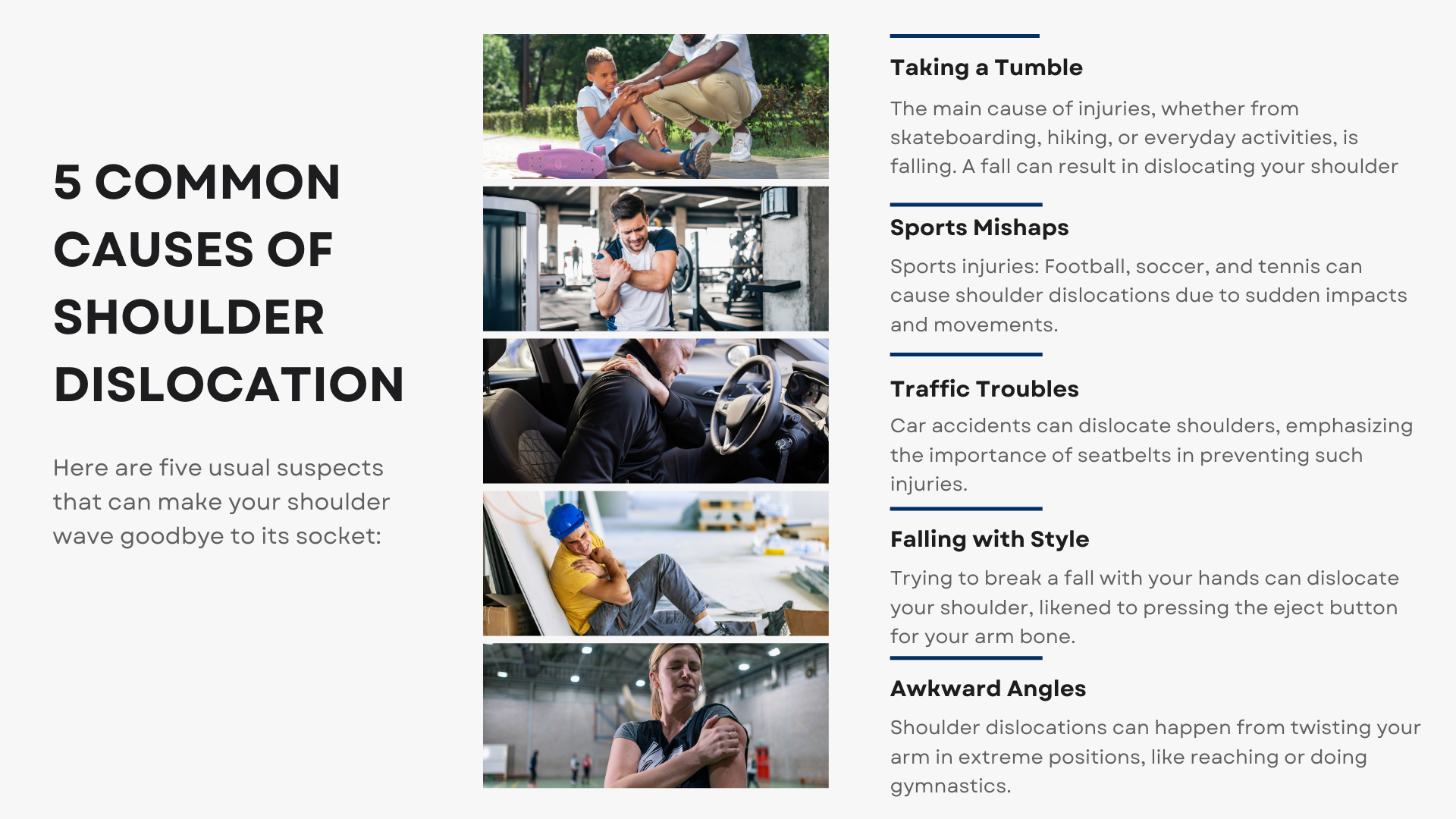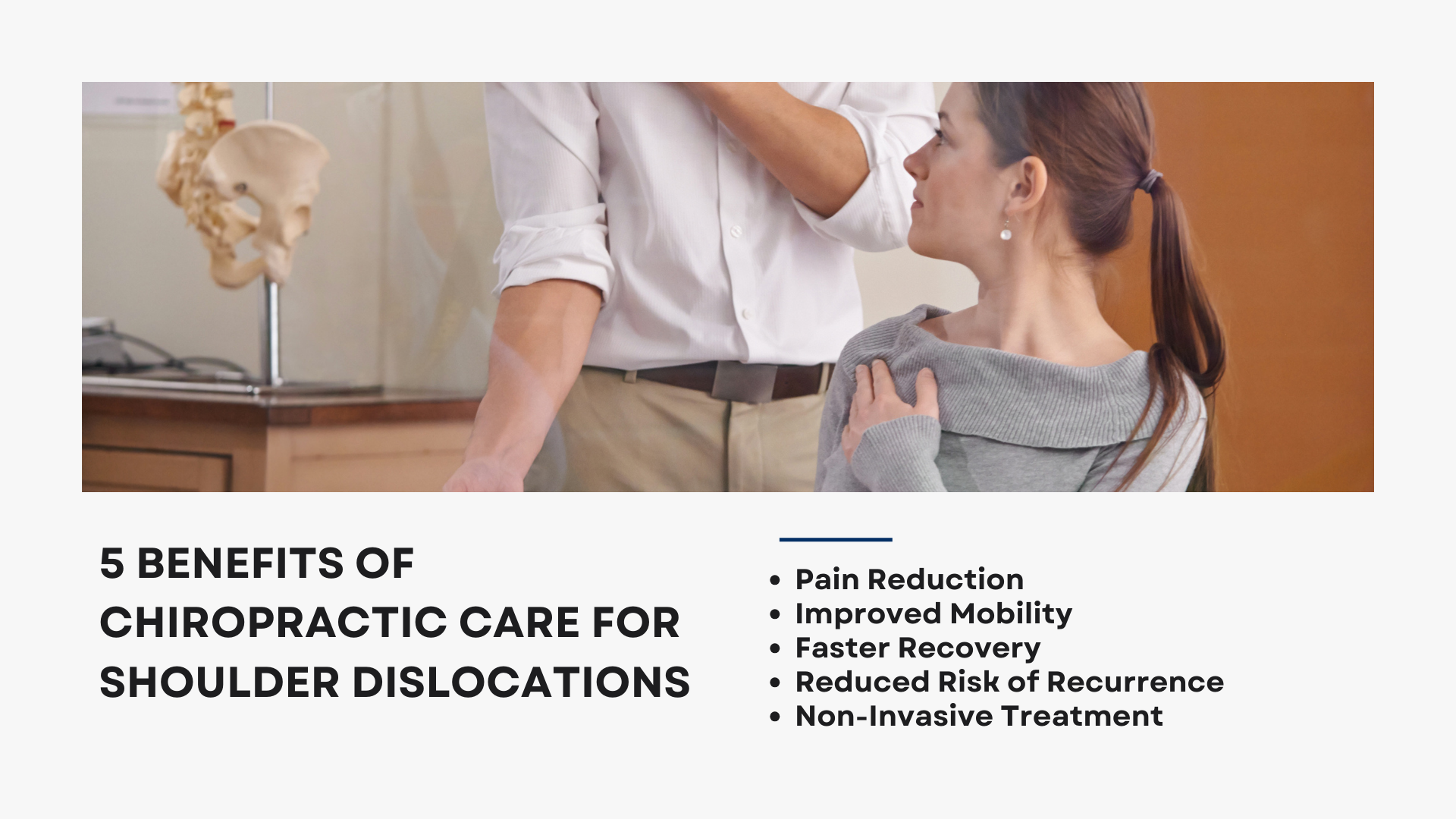Experiencing a dislocated shoulder can be incredibly painful and destabilizing, hindering everyday movements and causing significant discomfort.
What is the role of chiropractic care in the post-dislocation phase, and how can chiropractic techniques alleviate pain, promote muscle stability, and aid recovery?
We’ll explore the effectiveness, techniques, and benefits of chiropractic treatment after shoulder dislocations.
What Is a Shoulder Dislocation?
So, you’ve dislocated your shoulder?
Ouch.
Here’s what happened: the top part of your arm bone popped out of its usual spot in your shoulder blade. Think of it like a ball slipping out of its socket. It hurts right away, and suddenly, moving your arm feels extremely painful.
This mishap usually happens after a nasty fall, when someone or something hits your shoulder hard, or your arm gets twisted awkwardly.
And yes, it looks as bad as it feels, with your shoulder looking all wonky and out of place.
How Will I Know if My Shoulder Is Dislocated?

Imagine your shoulder going on an unexpected journey away from its comfy socket. Shoulder dislocation pain is nothing to shrug off; it’s sharp, deep, and takes over any attempt to move your arm.
Your shoulder screams, “Don’t even think about it!”
A dislocated shoulder is a condition that demands immediate attention and is marked by a set of unmistakable symptoms:
- Significant Pain: The primary signal of a dislocated shoulder is considerable pain. This sharp discomfort makes any arm movement challenging and serves as an urgent alert that something is amiss.
- Swelling: Noticeable swelling in the shoulder area is a typical response to dislocation. This swelling is a physical sign of the trauma the joint has undergone and contributes to the overall discomfort.
- Numbness or Tingling: Alongside swelling, you may experience a numb or tingling sensation, indicating that the dislocation may affect the nerve function in the shoulder and arm.
- Visible Deformation: A dislocated shoulder often leads to a visible alteration in the shoulder’s appearance. This may manifest as unnatural shoulder positioning or a distinct lump where the bone has moved out of place.
Further symptoms to note:
- Arm Positioning: A person with a dislocated shoulder might instinctively hold their arm in a specific way: at the side, slightly away from the body, with the forearm turned outward, to minimize pain.
- Change in Deltoid Muscle Contour: The deltoid muscle covering the shoulder may show a noticeable “step” or dip in its outline, a direct consequence of the bone shifting from its normal position.
When experiencing symptoms of a shoulder dislocation, seeking immediate medical attention is paramount.
Once the dislocation has been addressed and the shoulder has healed sufficiently, chiropractic care becomes an option worth considering for post-dislocation recovery.
Chiropractors possess the expertise to treat shoulder dislocations using precise manipulation techniques and other therapeutic methods.
Their approach focuses on promoting muscle stability and alleviating pain while being mindful of potential complications, particularly those involving nerves and blood flow to the arm.
After the initial medical intervention and healing process, individuals can explore chiropractic care as part of their comprehensive recovery plan.
Will a Dislocated Shoulder Heal on Its Own?
While minor discomforts can often heal independently, a dislocated shoulder requires prompt medical treatment to realign the bone, mitigate pain, and restore function.
Left untreated, this condition can lead to chronic instability, weakness, and even arthritis.
5 Common Causes of Shoulder Dislocation

1. Taking a Tumble: Whether you’re a pro skateboarder, a weekend warrior on the hiking trails, or just missed a step on the staircase, falls are the top culprits. Landing the wrong way can pop your shoulder out like a cork from a champagne bottle.
2. Sports Mishaps: Contact sports? Extreme sports? Even non-contact sports can send you to Dislocation City. Football tackles, soccer collisions, or an aggressive swing in tennis can all do the trick. It’s the unexpected impacts and movements that catch your shoulder off guard.
3. Traffic Troubles: Car accidents are no joke, especially for shoulders. A sudden jolt from a crash can easily dislodge your shoulder, proving that seatbelts save more than lives – they can save shoulders, too.
4. Falling with Style: Ever tried to break a fall with your hands? It’s intuitive but risky. Extending your arm to catch yourself can send a shockwave to your shoulder, dislocating it on impact. It’s like pressing the eject button for your arm bone.
5. Awkward Angles: Sometimes, it’s not about force but the angle. Twisting your arm in an unusual or extreme position (think reaching for that back shelf or performing a gymnastic move) can pull your shoulder out of its socket. It’s all about the wrong move at the wrong time.
The Effectiveness of Chiropractic Treatment for Shoulder Dislocations
Chiropractic care has shown promising results in treating shoulders post dislocation. Chiropractors focus on noninvasive techniques to reduce pain, enhance mobility, and strengthen the surrounding muscles, thus promoting natural healing.
4 Chiropractic Techniques for Treating Shoulder Dislocations

Here are four techniques that chiropractors often use to treat shoulders post-dislocation:
1. Gentle Manipulation: Chiropractors employ controlled movements to aid in rehabilitating the shoulder joint following dislocation.
While they do not typically perform the initial reduction (i.e., putting the bone back into the socket), chiropractic manipulation techniques help restore proper alignment and function to the shoulder joint during the post-dislocation phase.
This gentle manipulation focuses on promoting healing, reducing pain, and improving mobility without force but with careful precision and timing.
2. Soft Tissue Therapy: Following a shoulder dislocation, muscles and ligaments surrounding the area may become tense, swollen, or injured.
Chiropractors employ various massage and soft tissue therapy methods to alleviate pain and inflammation, promoting healing and restoring mobility to the affected tissues.
3. Mobilization Exercises: Once the shoulder begins to heal, chiropractors can introduce specific exercises designed to enhance the range of motion, strengthen shoulder muscles, and improve overall stability.
These exercises aim to rehabilitate the shoulder joint and prevent future dislocations by promoting strength and flexibility.
4. Lifestyle and Ergonomic Advice: Sometimes, how you move, work, or play contributes to shoulder issues.
Chiropractors can advise you on adjusting your daily activities, work setup, or sports techniques to keep your shoulder safe.
Through these techniques, chiropractic care aims to restore your shoulder’s mobility, strength, and confidence after a dislocation, setting you up for a smoother, more comfortable recovery.
5 Benefits of Chiropractic Care for Shoulder Dislocations

1. Pain Reduction: Chiropractic adjustments can significantly decrease the pain associated with a dislocated shoulder.
2. Improved Mobility: Chiropractic care can restore range of motion through tailored exercises and manual therapy.
3. Faster Recovery: Chiropractic techniques aim to expedite healing, allowing for a quicker return to daily activities.
4. Reduced Risk of Recurrence: Strengthening and stabilizing the shoulder joint through chiropractic care can diminish the likelihood of future dislocations.
5. Non-Invasive Treatment: Chiropractic care offers a drug-free, surgery-free approach to shoulder dislocation treatment, focusing on the body’s natural healing abilities.
When to Seek Medical Intervention for Shoulder Dislocation Beyond Chiropractic Care
While chiropractic care offers numerous benefits for treating shoulder dislocations, cases involving severe damage to the shoulder joint, ligaments, or nerves may require additional medical interventions, such as orthopedic surgery.
It’s crucial to consult with healthcare professionals to determine the most appropriate course of treatment for your specific condition.
Maintain Shoulder Joint Health with Chiropractic Treatment in New Jersey!
The chiropractic team at Bergen Chiropractic and Sports Rehabilitation Center adheres to the highest medical standards to provide superior chiropractic care. Our mission is to provide unparalleled patient care in a comfortable, healing atmosphere.
Access our contact form or call us at (201) 945-4075 to learn more about our chiropractic care services! Our offices at 532 Anderson Avenue, Cliffside Park, NJ 07010, and 62 Summit Ave, Hackensack, NJ 07601, are ready to welcome you as we proudly serve the areas of New York, New Jersey, Philadelphia, PA, and Baltimore, MD. Also, access our blog, Facebook, and Instagram pages for more information on chiropractic care for dislocated shoulders!
*In New Jersey, chiropractors are not authorized to treat dislocated shoulders; however, they can address the symptoms associated with a dislocated shoulder.








